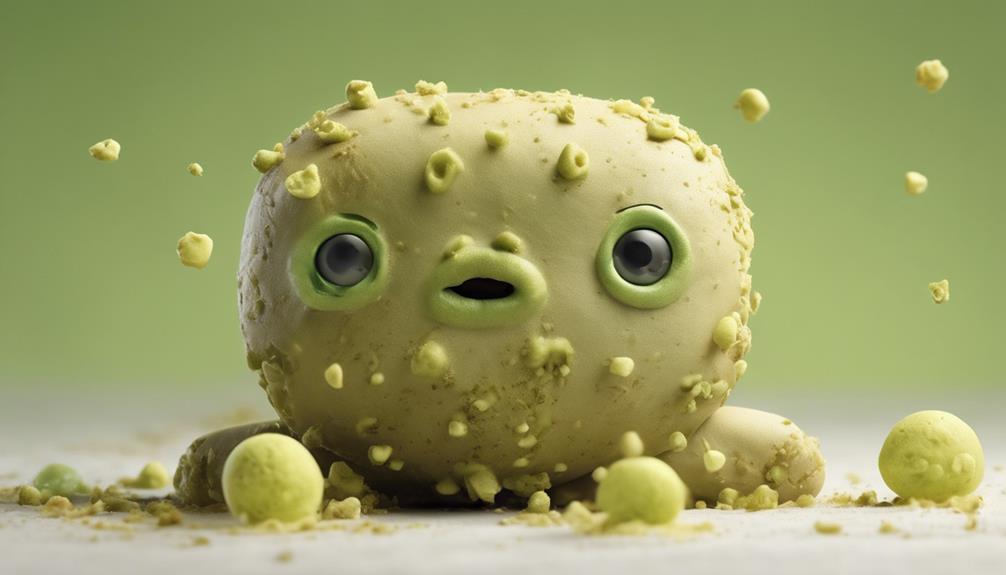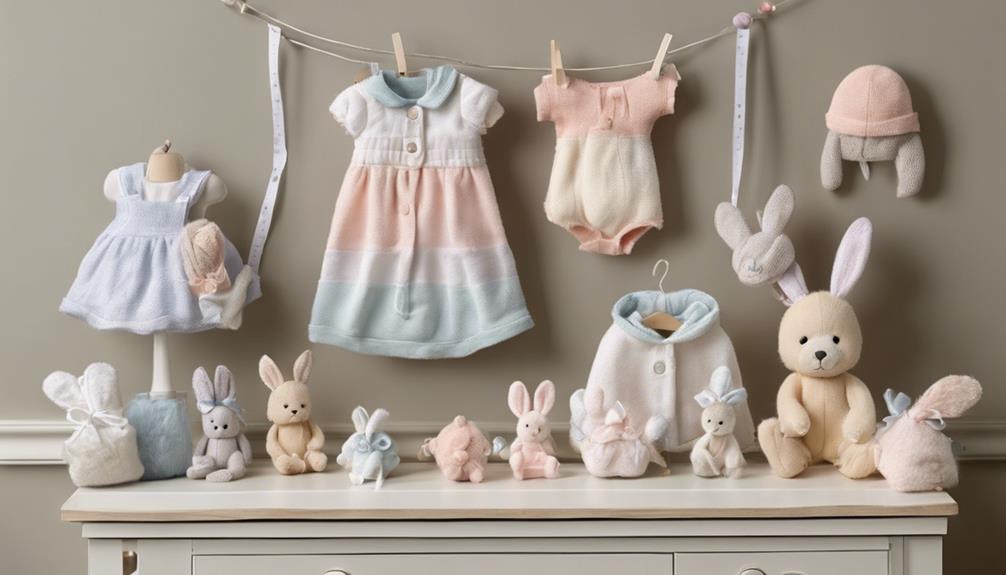As parents, we've all experienced those moments of uncertainty when it comes to deciphering our newborn's poop smell. You may have noticed variations in the odor of your baby's bowel movements, sparking questions about what's normal and what's not.
Understanding the nuances of newborn poop smell can offer valuable insights into your little one's well-being, guiding you in making informed decisions about their health. But what exactly should you be looking out for when it comes to those distinctive scents?
Key Takeaways
- Newborn poop initially lacks odor due to minimal gut bacteria.
- Breastfed baby poop smells milder than formula-fed poop.
- Changes in poop smell may indicate digestive issues.
- Promptly consult a pediatrician for persistent foul-smelling poop.
Why Does Newborn Poop Smell?
In the early days, newborn poop may exhibit minimal odor due to the absence of gut bacteria. As these beneficial bacteria begin to populate the gut, the smell of newborn poop gradually develops. Generally, breastfed baby poop tends to have a milder odor compared to formula-fed baby poop. However, in some cases, extremely foul-smelling newborn poop could indicate potential absorption or digestive issues that warrant attention.
Monitoring changes in the smell of your baby's poop is important. Any significant deviations from the usual smell should be discussed with a pediatrician promptly. It's essential to be vigilant, as foul-smelling poop can sometimes be an early indicator of underlying health concerns. Seeking professional advice can help address any potential issues early on and guarantee your baby's well-being.
Recognizing Normal Newborn Poop

Recognizing normal newborn poop involves closely observing its consistency, color, and frequency to assess the baby's digestive health. When monitoring your baby's bowel movements, it's essential to pay attention to the following key points:
- Odor: Normal newborn poop initially has little smell due to the lack of gut bacteria. Breastfed baby poop typically smells less than formula-fed baby poop.
- Changes: Any sudden changes in the smell of newborn poop may indicate digestive issues or infections. Foul-smelling newborn poop should be discussed with the pediatrician promptly.
- Importance of Monitoring: Regularly monitoring the smell of newborn poop is vital for detecting potential health issues early on.
- Consulting a Professional: If you notice any persistent foul-smelling smell in your baby's poop or have concerns about their digestive health, it's always best to seek advice from your pediatrician.
Factors Influencing Newborn Poop Odor
Factors influencing newborn poop odor vary depending on the baby's diet and digestive system health. Breastfed newborn poop typically has an odorless or mildly sweet smell due to the important digestibility of breast milk.
In contrast, formula-fed newborn poop may have a slightly stronger odor because of the different composition of formula. Changes in newborn poop odor can be indicative of underlying issues such as digestive problems, food sensitivities, or infections.
If the poop emits an extremely foul smell, it could suggest more serious conditions like nutrient absorption issues or gastrointestinal problems that require medical attention. It's essential to monitor newborn poop odor regularly to detect any abnormalities or shifts that could impact the baby's health and well-being.
Detecting Abnormal Smells in Newborn Poop
When observing newborn stool, particularly regarding odor, it's essential to note any abnormal smells that could indicate underlying digestive issues or nutrient absorption problems.
- Abnormal smells in newborn poop, such as a foul or extremely strong odor, may indicate potential digestive issues or nutrient absorption problems.
- Changes in the smell of newborn poop, especially if persistent or worsening, should be discussed with a pediatrician to guarantee any underlying health concerns.
- Healthy newborn poop typically has little odor initially, with breastfed baby stools being less smelly than formula-fed baby stools.
- Extremely foul-smelling newborn poop could be a sign of poor digestion or an imbalance in gut bacteria, warranting medical attention.
Paying attention to any unusual or persistent odors in newborn poop can provide valuable insights into the baby's digestive health. If you notice any abnormal smells, consulting with a pediatrician is recommended to guarantee the baby's well-being and address any potential issues promptly.
Tips for Managing Newborn Poop Odor
To effectively manage the odor of newborn poop, parents should implement proper hygiene practices and dietary adjustments as recommended by healthcare providers. Maintaining cleanliness in diaper changing areas, using odor-neutralizing products, and making sure proper ventilation can help reduce the impact of newborn poop smell. Dietary adjustments, such as avoiding certain foods that may contribute to foul-smelling poop in formula-fed babies or breastfeeding mothers, can also play a significant role in managing odor. Below are some tips for managing newborn poop odor:
| Tip | Description | Benefits |
|---|---|---|
| Hygiene Practices | Regularly changing diapers and cleaning the diaper area thoroughly can help minimize odor. | Promotes cleanliness and reduces smells. |
| Odor-Neutralizing Products | Using products specifically designed to neutralize odors can be effective in managing poop smell. | Helps eliminate unpleasant odors. |
| Ventilation | Making sure proper airflow in the changing area can help dissipate odors quickly. | Reduces the concentration of poop smell. |
| Dietary Adjustments | Consulting with healthcare providers to make dietary changes can impact the odor of baby's poop. | Address underlying causes of foul odor. |
| Seeking Medical Attention | Persistent foul-smelling poop or changes in odor warrant medical evaluation for potential issues. | Ensures prompt treatment for underlying conditions. |
Frequently Asked Questions
Is It Normal for Newborn Poop to Smell?
Yes, it's normal for newborn poop to gradually develop a smell as they grow and their digestive system matures. However, extremely strong odors or sudden changes may signal issues requiring pediatrician evaluation for best care.
What Does Newborn Poop Tell You?
Newborn poop provides important clues about their health. Changes in smell can indicate issues like nutrient absorption. Foul odors warrant attention. Consulting a pediatrician is essential for persistent concerns. Your baby's poop speaks volumes.
What Does Stinky Poopy Baby Mean?
Stinky poopy baby may indicate digestive issues or food intolerance. Strong odor could signal gut bacteria imbalance or certain foods in the baby's diet. Persistent foul smell warrants pediatrician's attention. Monitor changes for health concerns.
What Is the Progression of Newborn Poop?
We've seen it all, from inky meconium to seedy mustard yellows. As newborns grow, their poop changes, reflecting diet shifts. Breastfed babies' stools differ from formula-fed. Introducing solids alters textures. Monitoring these shifts enlightens us on baby's digestion.
Conclusion
To sum up, understanding your newborn's poop smell can provide important insights into their health. Just like a compass guiding us through uncharted waters, the odor of your baby's stool can help navigate potential issues and guarantee their well-being.
By paying attention to any changes in smell, consistency, or your baby's comfort, you can confidently address any concerns with your pediatrician and steer your little one towards a healthy path.









